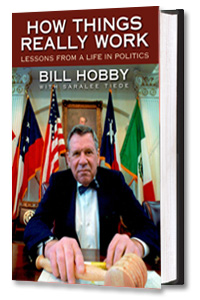Poor Tom Delay! He can’t get off the ballot.
Poor Republicans! They can’t get him off the ballot!
Why?
Because in the early 1980s, both parties ignored their own voters in the primaries and replaced candidates whom the voters had nominated (“stalking horses”) with candidates more acceptable to the party leadership. Just as the Republican Party has unsuccessfully tried to do now by replacing Tom DeLay.
In other words, the Republicans are lying in a bed they helped to make. The result is likely to be that the only Republican seat to be lost as the result of DeLay’s shenanigans will be the one DeLay has resigned.
In 1983 the Legislature passed Senate Bill 122 to stop the parties from ignoring their own primary voters by removing nominees from the November ballot and replacing them with other nominees without the voters’ approval.
An amicus curiae (friend of the court) brief was filed in the recent lawsuit filed by the Democratic Party to keep the Republican Party from replacing former Congressman DeLay on the ballot.
The friends of the court were members of the Legislature in 1983. The brief pointed out:
“During the 1980 primary season, seven candidates from both major political parties declined their nomination. These candidates were four state representative candidates, two district judges, and one court of civil appeals candidate.
“In the 1982 election season, the trend accelerated with ten candidates declining the nomination, including statewide candidates. In the Republican Party, a district attorney candidate, two state representative candidates, one candidate for U.S. Representative, a State Treasurer candidate, and an Agriculture Commissioner candidate declined and were replaced. In the Democratic Party, a U.S. Representative candidate, a state representative candidate, and two district judge candidates declined and were replaced.”
When SB122 was heard in the Senate State Affairs committee the sponsor (then-Senator Kent Caperton) summed up the need for the bill:
“it clears a deficiency… concerning the replacement of nominees in primaries. The current code allows the possibility that the general public has no say in who is the nominee of particular parties. In fact, we saw that occur last spring where not through ineligibility, not through unavailability to serve, or not through any other reason than political considerations.”
State Affairs chairman Ray Farabee was concerned that an unforeseen catastrophic illness would be a legitimate reason for a candidate’s withdrawal but pointed out that a court should decide about that. Farabee wanted the illness to be documented by “providing for evidence to substantiate the illness so that it’s there and determined, as compared to people who are getting together and deciding that, well, I don’t feel too well, but it would be a lot better to run with this [other] candidate at this stage.”
SB122 was reported out of committee and passed by the Senate with little opposition.
The House committee addressed Farabee’s concerns by amending the bill “to allow replacement of a candidate who withdraws only if it was for “catastrophic illness” that was diagnosed after the 65th day before the primary election (i.e., that was unforeseen), “that would incapacitate the nominee permanently and continuously to prevent him from performing the duties of the office sought”, and that is certified by the signatures of two licensed physicians. These stringent requirements remain in current law.”
The Senate concurred in the House amendments overwhelmingly.
In other words SB122 passed the legislature with little controversy and strong bipartisan support. The bill was made necessary by bipartisan abuses of the Election Code as it existed until 1983.
I am proud that all this happened on my watch as Lieutenant Governor 23 years ago.
(Bill Hobby was Lieutenant Governor of Texas 1973-91. All quotes are from the amicus curiae brief. The full text of the brief is at www.hobbycomm.com/wph/amicusbrief.pdf and http://www.capitolannex.com/COURTFILINGS/68thAppendix.pdf)).

